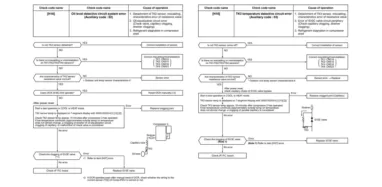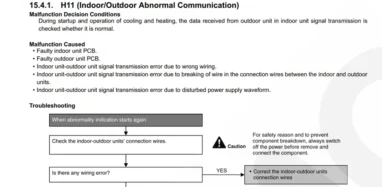Have you noticed how your house air conditioner smells like vinegar? Once the summer months kick in, one common problem that may leave you wondering is that nasty odor coming from your AC unit. When the days get warmer, you also regularly use your air conditioner and this is when you notice that strange smell every time you turn on your unit.
Why does my ac smell like vinegar? An air conditioner that gives off a sour smell probably suffers from a problem that has something to do with the condensation removal system. This condensation is the byproduct of that cooling method within the air conditioner. Once drained improperly, this condensation may form the necessary conditions for foul-smelling mold, and bacteria can grow within your system.

What’s with the vinegar smell?
Why does AC smell like vinegar? That weird vinegar smell that comes through the supply registers often points to the improperly drained stagnant water inside your unit. If you don’t take this issue seriously and it is left forgotten, there is a big chance that mildew and mold will turn into a problem later on. If you address this smell sooner, the lesser damages that your AC unit will suffer from.
If the air that comes from your home’s air conditioning system smells sour, just like vinegar, the issue might be coming from an electric motor that emits ozone. Some other possible causes include too much condensation on coils, a clogged condensate pan, mold in the ductwork, or a malfunctioning filter.
Read on below to know more about the possible causes behind that vinegar smell coming from your house aircon.
A malfunctioning filter
An old or cold air conditioner filter may lead to a myriad of issues for your AC system. A malfunctioning filter will prevent your air conditioning unit from pulling in enough air that will be cycling throughout the system.
As a result, the air within the unit increases in humidity and dampens everything inside the system that can create the ideal conditions where mildew and mold can grow. Then your AC will smells like vinegar.
To prevent vinegar smell from AC, check is it your filter functions properly and replace or clean the filter at the intervals indicated in your unit’s user manual.
Excessive condensation on coils
All types of air conditioners function the same way and that is through pulling in the indoor air through the filter then blowing this across the refrigerant-filled copper coils. These coils simultaneously lower the air temperature and “sweat” or gather condensation from the air’s humidity. This condensation gets drained to the condensate pan where it will be disposed of, with the cold dry air getting blown back into the house. This condensate pan is affixed to the condensate pump that will pump the water either to the soil outside the house or to a floor drain.
Clogged condensate pan
If you have been running your air conditioner for a certain period of time with no filter or it hasn’t been serviced of late, you might end up dealing with a clogged condensate pan. This condensate pan that can be found in the air handler right under the refrigerant coils is responsible for catching condensation while it drains from cold coils.
Debris materials like hair may block off the drain hole in the middle of the pan that can cause a foul odor and water backup. If this is the cause, make sure to wipe and clean the pan with the use of a piece of wire or paper clip to clean out some portions of the drain opening.
Mold in ductwork
There might already be mildew and mold growth in the ductwork if you have been dealing with moisture issues in your air conditioning unit for quite some time now. This situation can be potentially dangerous since some mildew and mold can be very damaging to the quality of indoor air.
If you think that the issue lies in your ducts, be sure to replace them right away and get the help of mold professionals to know how you can lower the risks of inhalation.
Other common smells coming from home AC units
Aside from the smell of vinegar, house aircon can also give off other kinds of smells. For example, window air conditioner smells like fish. Learning how to diagnose and differentiate these smells will make it easier for you to address the underlying issues accordingly.
- Burning Smell
It is safe to say that you have an electrical issue at hand if you notice a burning smell that seems to come through the vents of your unit. These problems usually occur in older houses since their units have been around for quite some time already.
To fix this smell, all it takes is to replace the circuit board that has probably or has the blower fan replaced since its motor burned out.
- Musty Smell
When the air that comes through the supply registers reminds you of a wet towel, your problem likely has something to do with mildew. It means that there might be fungus or mold growing around or in your outside unit. It is a rather common issue.
An AC unit not just adjusts the indoor temperature of your house as this also lowers or gets rids of the levels of humidity at the same time. If the compressor doesn’t get drained properly, mildew and mold may form on the lingering moisture. Changing the filter of your unit can also be considered since it is usually the reason for this smell.
- Rotten Smell
Rotten smell often has one main culprit and that is none other than dead animals. It is often the problem if the odor you are experiencing is of spoiled nature. Especially in the winter months, animals will look for shelter in your AC unit. It is best to let the experts clean your unit for you if this is the problem as there are a lot of health hazards associated to dead animals, particularly those that have been there for a long time.
- Sewage Smell
Although self-explanatory, this one is among the most dangerous causes of smell coming from your house aircon. It often indicates that the sewer system has a backup. It can be due to a ruptured sewer vent pipe close to the ducting. If this occurs, even the smallest amount of methane may leak into the ventilation system that can be quite hazardous.

